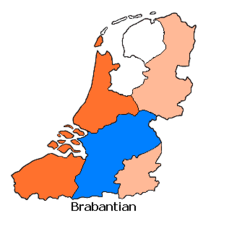Brabantian
2007 Schools Wikipedia Selection. Related subjects: Languages
|
This article is a part of the Dutch dialects series. |
|---|
 |
| The Dialects |
| Brabantian |
| Hollandic |
| West Flemish |
| Zealandic |
| East Flemish |
| Zuid-Gelders |
| Dutch Low Saxon |
| Limburgish |
Brabantian or Brabantic (Brabantic: Braobans; Dutch: Brabants) is a dialect of the Dutch language spoken in the Dutch Province of North Brabant and in the Belgian provinces of Antwerp and Flemish Brabant and small parts in the west of Limburg. In the northwest of Brabant ( Willemstad), Hollandic is spoken. Conventionally, the Zuid-Gelders dialects are distinguished from Brabantian, though there are no objective criteria apart from geography to do this.
Because of the relatively large area in which Brabantian is spoken, it can be roughly divided in three sub-dialects:
- West-Brabantian, spoken in the area west of the river Donge; in the west of North Brabant (the area around the cities Breda and Roosendaal) and in the north and west of the Province of Antwerp in Belgium.
- East-Brabantian, spoken in the area east of the river Donge; in the middle and east of North Brabant (the area around the cities Tilburg, Eindhoven, 's-Hertogenbosch and Helmond), the east of the Province of Antwerp and the far west of the Province of Limburg.
- South-Brabantian, spoken in the province of Flemish Brabant and the south of Antwerp.
Brabantian is not recognized as a minority language in the Netherlands: as standard Dutch is partly based on Brabantian, there is no need of a separate Brabantian standard.
About one third of the Dutch-speaking population lives in the Brabantian dialect zone. In large Dutch towns such as Breda and Eindhoven, where many people speak Hollandic dialects, Brabantian dialects have been abandoned, whereas in rural areas many people still speak the original dialect. Tilburg and 's-Hertogenbosch, however, have a large number speaking the Brabantian dialect.
In Belgium, dialects are still the common spoken language. In the capital of Brussels, French largely replaced Dutch in the middle of the 20th century. Despite this, there are many cultural activities using the Brussels dialect. Moreover, use of Dutch is reviving among young Dutch-speaking families who are moving back from the suburbs toward the old city centre.
